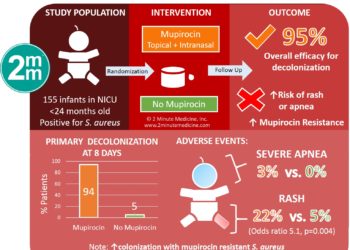The CLEAR trial: decolonization routine associated with lower infection risk among MRSA carrier patients
1. Hospitalized patients with known MRSA colonization randomized to undergo a decolonization routine were found to have lower risks of MRSA infections one year after their hospital discharge dates as compared to patients who received educational materials only.
2. Patients randomized to receive decolonization routines also had lower risks of infections from any cause and lower risks of infection-related hospitalization.
Evidence Rating Level: 1 (Excellent)
Study Rundown: Methicillin-resistant staphylococcus aureus (MRSA) bacteria can cause aggressive soft tissue infections. MRSA infection rates are noted to be highest among patients who have recently been discharged from the hospital. In the CLEAR (Changing Lives by Eradicating Antibiotic Resistance) Trial, researchers assessed the comparative effects of education versus education plus decolonization routines on MRSA infection rates among recently discharged patients colonized with MRSA. Decolonization routines included the use of chlorhexidine body wash, chlorhexidine mouth wash, and nasal mupirocin at timed intervals over six months after discharge. Researchers found that patients who were randomized to the education and decolonization routine group experienced significantly lower rates of MRSA infections as compared to the group that received education materials only.
Though this trial was unblinded, its results can be considered generalizable as it was applied to a large, diverse patient population. The study’s main limitation is the feasibility of decolonization program implementation given the extended time course of decolonization procedures.
Click to read the study in NEJM
Relevant Reading: Strategies for prevention of methicillin resistant Staphylococcus aureus (MRSA) infections and decolonization
In-Depth [randomized controlled trial]: This multicenter, randomized controlled trial enrolled 2140 participants in Southern California between 2011 and 2014. Participants were randomly assigned in a 1:1 ratio to receive either educational materials about MRSA infections and proper hygiene to prevents (n= 1063) or educational materials plus decolonization routines (n= 1058), including the use of a 4% rinse-off chlorhexidine body ash, 0.12% chlorhexidine mouthwash (to be used twice daily), and 2% nasal mupirocin (to be used twice daily). Patients in the decolonization group were instructed to use these interventions for five days twice monthly for at least six months after hospital discharge. Patients were followed for 12 months after their hospital discharge through timed visits at 1, 3, 6, and 9 months post discharge. The primary outcome of this trial was rate of MRSA infection after discharge as defined by CDC criteria. Secondary outcomes included rates of MRSA infections based on clinical judgement, rates of infection from any cause, and rates of infection-related hospitalization. Researchers found that 98 of 1058 patients (9.2%) in the education group and 67 of 1063 patients (6.3%) in the decolonization group had a MRSA infection. The risk of MRSA infections was significantly lower among patients in the decolonization group compared to the education-only group (hazard ratio [HR], 0.70; 95% CI, 0.52 to 0.96; P=0.03). The decolonization group also had a lower risk of clinically-judged infection from any cause (HR, 0.83; 95% CI, 0.70 to 0.99) as well as lower rates of infection-related hospitalization (HR, 0.76; 95% CI, 0.62 to 0.93). Approximately 65% of patients in the decolonization group fully adhered to treatment. Adverse effects in the decolonization group occurred in roughly 4.2% of patients and were noted to be mild in nature.
Image: PD
©2019 2 Minute Medicine, Inc. All rights reserved. No works may be reproduced without expressed written consent from 2 Minute Medicine, Inc. Inquire about licensing here. No article should be construed as medical advice and is not intended as such by the authors or by 2 Minute Medicine, Inc








